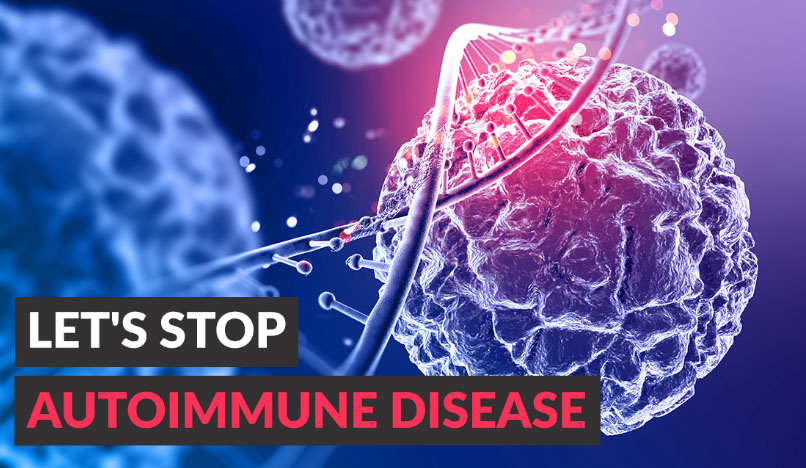
If you or a loved one has an autoimmune disease, you know that this condition can be daunting, painful, and crippling. This is extremely difficult to treat. And it can manifest across a wide range of symptoms. It's not easy to get to the root cause, and it can take a long time.
Autoimmune diseases like lupus, rheumatoid arthritis, and thyroid issues are painful, debilitating, and sometimes crippling. They have one thing in common at their core: an immune response that is out of balance, attributed to systemic inflammation.
It is estimated that up to 700 million people worldwide suffer from autoimmune disorder. And autoimmune disorders are the third most common type of illness in the U.S., after cancer and heart disease. Approximately 78% of cases of autoimmune disease occur in women.
Toxins Can Cause Autoimmune Disease
We are constantly exposed to large amounts of dangerous chemicals on a regular basis. Our bodies are bombarded by poisons day in and day out from the pollutants in our environment, the pathogens in our water, the pesticides in our diet, and the mixture of additives and toxins in our products.
The average American adult is saturated with 400 toxic chemicals – and that’s a low estimate since only 543 chemicals were tested out of more than 80,000 that are used in consumer products.
We don't know the effects all of these substances would have on our bodies, as there are plenty of substances that we are constantly exposed to. However, keep in mind that maintaining a higher toxic load puts us at an elevated risk of developing an autoimmune illness, and lowering toxic load helps to reverse autoimmune condition.
But, a good way of protecting yourself from toxic overload is for you to know what a few of these toxins are and where you can usually acquire them. Here’s a shortlist of common toxins that are linked to autoimmune disease.
1. Excitotoxins
These are chemicals that over-stimulate our taste buds and neural receptors. Commonly used excitotoxins such as monosodium glutamate (MSG), soybean extract, and aspartame (Equal) found in diet sodas, sugar-free chewing gum, etc. could trigger autoimmune disease.
2. Bisphenol A (BPA)
Bisphenol A (BPA) is a material used for hardening plastics. It is used in bottles of water, food containers, utensils, and toys. BPA can leak into water and food — especially when containers are heated. It causes many immune reactions involved in the development of autoimmune disease.
3. Medications
There are at least 46 widely used drugs that can cause lupus. The list contains medications for treating heart disease, thyroid disease, hypertension, and conditions of neuropsychiatry. Some anti-inflammatory agents and antibiotics are on this list, as are intravenously used biologics to treat rheumatic diseases.
4. Personal Care Products
Most women use at least 12 personal care products on average. These products contain over 150 unique ingredients that potentially have carcinogenic impurities common to personal care product ingredients.
5. Pesticides
Long-term exposure to pesticides, according to the results of a long-term study of 77,000 postmenopausal women, may increase your risk of developing autoimmune diseases such as lupus and rheumatoid arthritis.
Detox
Our body’s detoxification process also involves getting plenty of the vitamins and minerals the liver (where much of the detoxification occurs) requires, keeping hydrated, and performing things that help you sweat. Undergoing detoxification helps your body get rid of the toxins and lessens your risk to autoimmune diseases.
Reducing the toxic burden on your body can free your body to build new cells more quickly, get rid of old cells, and repair cell damage. This will increase your body's ability to detoxify, help you eliminate stored toxins, and help reduce autoimmune toxicity disorders.
We need to support our bodies by unburdening our toxic load, so that we have a chance to fight against the growing environmental assault. The best approach is proactive, gentle and continuous detoxification rather than a few harsh, fast, and easy cleanses per year.
And here are a few habits that help us detoxify.
- Drink and Bathe in Filtered Water
Drink filtered water or spring water, and use a bath & shower filter system. Tap water contains fluoride, chlorine, copper, arsenic, herbicides, and even the minimal presence of prescription medicines.
- Eat Broccoli
Whole foods containing sulforaphane, the cancer-protective element in broccoli, have been shown to stimulate liver detox.
- Exercise
Exercise produces an enzyme which purges the body of harmful substances in the muscles. This may explain why aerobic exercise promotes better mood and decreases stress.
- Go Chemical-Free
Use non-toxic personal care products and household cleaning products. A good rule of thumb is that you do not use it unless you recognize the ingredients. Take it a step further and don't use it if you wouldn't eat it.
- Stick to Steel or Glass
Using water bottles made from stainless steel or glass. Stop drinking hot drinks from cups made of paper, plastic or foam. Paper cups are often filled with plastic which increases your toxicity.
- Use a Sauna
Use the sauna a couple of times a week. If you don't like the idea of being steamed like a chicken filet, you can choose near-infrared saunas. These infrared saunas help you to detoxify safely without having to experience the high temperature of a regular sauna.
Our bodies are designed to cleanse and detox themselves. However, when the toxic load becomes a crushing burden, accumulated toxins can cause a ripple effect of health problems including leaky gut, DNA damage, inflammation, autoimmune reactivity, and ultimately, autoimmune disease.
So, remember the toxins we are regularly exposed to and avoid them as much as possible. You have the opportunity to transform your health by making these detox habits a part of your healthy lifestyle!
--------------
Sources:
https://www.ncbi.nlm.nih.gov/pmc/articles/PMC3328995/
https://www.ewg.org/sites/humantoxome/participants/participant-group.php?group=adult
http://www.naturalnews.com/035555_Russell_Blaylock_interview_excitotoxins.html
https://www.hindawi.com/journals/ad/2014/743616/
https://www.lupus.org/resources/medications-that-can-cause-drug-induced-lupus
https://www.ncbi.nlm.nih.gov/pmc/articles/PMC3593584/
https://www.mercola.com/article/water.htm
http://www.sciencedaily.com/releases/2014/09/140929124011.htm

We’d love to hear your thoughts in the comments below - we read each and every one of them!
